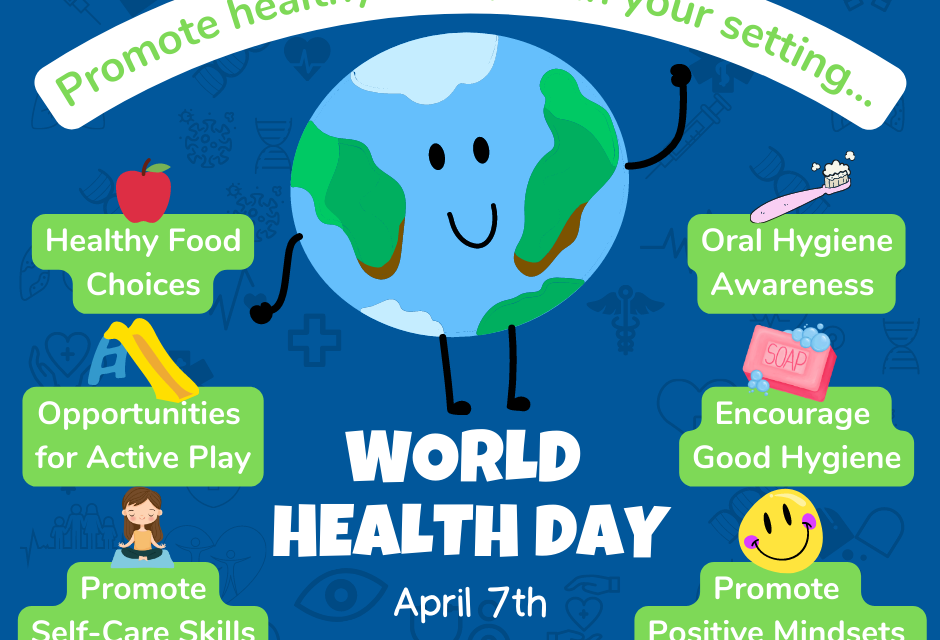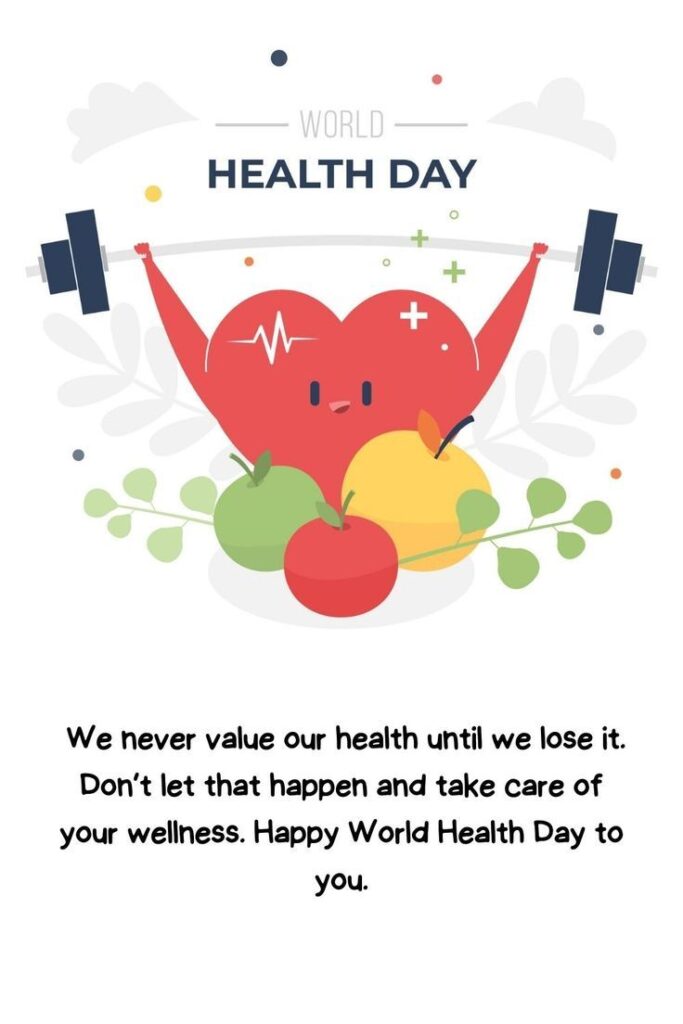
‘,’
‘ ); } ?>
Table of Contents
World Health Day: Promoting Global Well-being and Healthcare Awareness

Introduction
Every year on April 7th, the world observes World Health Day to highlight the importance of global health and well-being. Organized by the World Health Organization (WHO), this day serves as a reminder of the need to address health challenges and improve healthcare systems worldwide. The primary goal of World Health Day is to create awareness about pressing health issues and mobilize efforts to ensure a healthier future for all.
Health is one of the most valuable assets of an individual and a nation. Without proper healthcare and wellness initiatives, societies struggle with low productivity, high disease burdens, and a lower quality of life. This day plays a crucial role in educating people about the steps they can take to improve their personal health while also advocating for stronger health policies and services worldwide.
History and Significance
World Health Day was first observed in 1950, following the establishment of the World Health Organization (WHO) in 1948. The WHO was created to coordinate international efforts in combating diseases and promoting overall well-being. Since then, April 7th has been dedicated to addressing various global health concerns, sparking discussions, and initiating actions to improve healthcare services.
The observance of World Health Day plays a crucial role in:
- Raising awareness about critical health issues affecting people globally.
- Encouraging governments and policymakers to take action.
- Promoting healthy lifestyles and preventive measures.
- Advocating for better healthcare access for underserved communities.
Health is a fundamental human right, yet millions of people across the globe struggle with limited access to proper medical care. This disparity in health access is due to factors like economic inequality, political instability, and underdeveloped healthcare systems. World Health Day serves as a reminder to policymakers and global leaders to bridge these gaps and ensure that quality healthcare reaches every individual, regardless of their socio-economic status.
Themes of World Health Day

Each year, World Health Day focuses on a specific theme related to global health challenges. Some of the past themes include:
- 2023: “Health for All”
- 2022: “Our Planet, Our Health”
- 2021: “Building a Fairer, Healthier World”
- 2020: “Support Nurses and Midwives”
- 2019: “Universal Health Coverage: Everyone, Everywhere”
The theme for World Health Day 2024 is expected to focus on “Advancing Health Equity Through Innovation and Technology”, emphasizing the role of digital healthcare solutions in ensuring accessible and affordable medical services.
Each theme focuses on a specific aspect of global health concerns, reflecting the changing healthcare priorities of the world. By adopting a different theme each year, WHO ensures that attention is given to emerging health threats, thus encouraging governments, organizations, and individuals to work toward long-term solutions.
Global Health Challenges
Despite advancements in medical science and healthcare infrastructure, the world still faces several critical health challenges:
1. Communicable Diseases
Infectious diseases such as COVID-19, tuberculosis, malaria, and HIV/AIDS continue to pose threats to public health. Efforts to improve vaccination programs, sanitation, and healthcare accessibility are crucial in combating these diseases.
The COVID-19 pandemic highlighted the weaknesses of healthcare systems worldwide, emphasizing the need for global preparedness in handling health crises. Disease outbreaks require strong healthcare infrastructure, immediate response mechanisms, and international cooperation to minimize their impact.
2. Non-Communicable Diseases (NCDs)
Chronic illnesses such as diabetes, heart disease, cancer, and respiratory conditions are rising due to unhealthy diets, lack of physical activity, smoking, and pollution. World Health Day promotes awareness of preventive measures like regular exercise, balanced diets, and early screenings.
The rise of sedentary lifestyles, increased consumption of processed foods, and air pollution are all contributors to the increase in NCDs. Addressing these issues requires both individual lifestyle changes and government policies that support healthy living.
3. Mental Health Awareness
Mental health disorders, including anxiety, depression, and stress-related illnesses, are becoming increasingly common. World Health Day emphasizes the importance of mental well-being, encouraging societies to remove stigma and provide adequate support for individuals facing mental health challenges.
Mental health is as important as physical health. The stress of modern life, social media pressures, and economic hardships have led to an increase in psychological disorders. However, mental health continues to be overlooked in many regions due to stigma and lack of resources. Governments and institutions must work towards building mental health awareness campaigns, training professionals, and integrating mental health services into primary healthcare systems.
4. Healthcare Inequality
Millions of people worldwide still lack access to basic healthcare services due to financial constraints, geographical barriers, and insufficient medical infrastructure. The WHO advocates for universal health coverage to ensure that every individual receives the medical care they need.
The issue of healthcare inequality extends beyond financial aspects. Gender, ethnicity, and socio-political factors often determine access to healthcare. Women and marginalized communities in many parts of the world still struggle with inadequate healthcare facilities. Bridging these gaps is essential for achieving global health equity.
5. Climate Change and Public Health
Environmental issues like air pollution, water contamination, and rising temperatures significantly impact public health. Diseases linked to climate change are on the rise, necessitating urgent action to protect both the planet and human well-being.
Climate change contributes to health hazards such as extreme weather conditions, heatwaves, and increased vector-borne diseases like dengue and malaria. Sustainable policies and eco-friendly initiatives can help mitigate these risks and create a healthier environment for future generations.
How to Promote Health and Well-being on World Health Day
1. Raise Awareness
Use social media platforms, blogs, and community events to educate people about preventive healthcare, vaccinations, and healthy habits.
2. Support Healthcare Initiatives
Contribute to organizations working towards medical aid, mental health programs, and disease prevention.
3. Adopt a Healthier Lifestyle
- Eat a balanced diet with plenty of fruits, vegetables, and whole grains.
- Exercise regularly to maintain physical and mental fitness.
- Prioritize mental well-being through meditation, therapy, or relaxation techniques.
4. Encourage Preventive Healthcare
- Get regular health checkups to detect diseases early.
- Follow vaccination schedules to protect against preventable illnesses.
- Promote hygiene practices such as handwashing and sanitation.
5. Advocate for Health Equity
- Support policies that promote affordable healthcare for all.
- Raise concerns about healthcare infrastructure and accessibility in underserved communities.
- Encourage research and innovation in the medical field.
World Health Day messages :

🌍 Happy World Health Day! Let’s work together to make healthcare accessible for everyone and build a healthier future. 💙🏥
Health is the greatest wealth! On this World Health Day, let’s commit to taking care of our minds and bodies. 🏃♂️🍏
A healthy world begins with you! Eat well, exercise, and spread awareness for a better tomorrow. 🌱💪 #WorldHealthDay
Your health is in your hands! Take small steps daily to improve your physical and mental well-being. 🧘♀️🚴♂️
🌎 On World Health Day, let’s pledge to build a world where healthcare is a right, not a privilege! 💉🏥
Conclusion
World Health Day is a vital occasion that emphasizes the need for global health improvements and equal access to medical care. By spreading awareness, adopting healthier lifestyles, and advocating for better healthcare systems, we can contribute to a healthier and more sustainable world. Let us use this day to reaffirm our commitment to health for all and work towards a disease-free, healthier future.
Let’s celebrate World Health Day 2024 by prioritizing our health, well-being, and medical advancements! 🌍💙
“Want to know more? Check out this link.”
“Learn more about related events like :
World day for safety and health at work
by visiting this link.”
